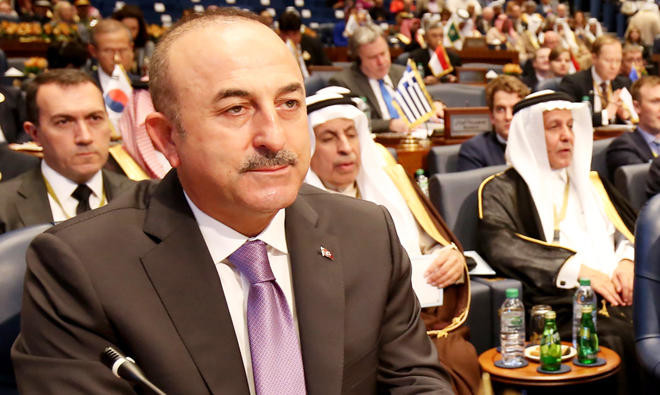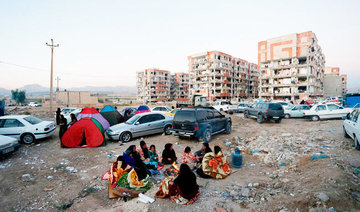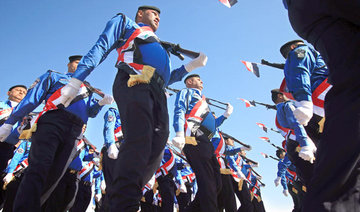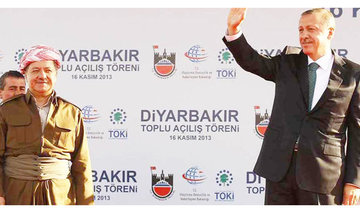ANKARA: A $5 billion commitment from Turkey to Baghdad to help rebuild the country is a clear statement of intent from Ankara of its ambitions in the country.
About $30 billion in loans and investments was secured at a donor conference in Kuwait on Wednesday. Iraq said it needs almost $90 billion for reconstruction efforts after three years of devastation by Daesh.
Turkey was by far the biggest contributor and also committed to provide $50 million to its neighbor for project support, along with social, cultural and economic projects by Turkish state aid agency TIKA.
The apparently generous support in the form of investment loans and guarantees marks a significant turning point for relations between the two countries.
The countries have been at odds over the presence of Turkish troops in Bashiqa in northern Iraq, where Turkey set up a camp in March 2015 to train local Sunni groups and Kurdish Peshmerga to fight against Daesh around Mosul.
Considering that Turkey spent just $6 billion on humanitarian aid in 2016, the pledge to Iraq came as a surprise to many.
Turkey, one of Iraq’s largest trading partners, hopes the pledge promises a “new opening” for Turkish businesses active in the country — particularly in infrastructure, consumer goods, construction and transportation.
But the loans also show how Turkey views the strategic importance attached to the country and a willingness to increase regional stability.
Analysts say Turkey wants to build on relations that were strengthened when the two countries took a common position against the Iraqi Kurdistan Regional Government (KRG) referendum for independence in September.
Bilgay Duman, an expert on Iraqi affairs at Ankara-based think tank ORSAM, said the financial assistance consolidates Turkey’s partnership with the Iraqi central government in fighting against the Kurdistan Workers Party (PKK) in the region.
The PKK has waged a decades-long insurgency against the Turkish state and both Baghdad and Ankara oppose the PKK’s presence in the Sinjar region of northern Iraq.
“Ankara’s anti-PKK efforts do not only target its own domestic security, but it also helps Iraqi central government in consolidating its territorial integrity and political unity ahead of the parliamentary elections on May 12, especially considering the presence of the PKK around Kirkuk,” he said.
Duman said the deepening of relations between Ankara and Baghdad was also meant as a counterweight to the potential clout of Iran in the region.
Iran-backed militias have become increasingly powerful in Iraq after the role they played against Daesh, and Ankara, along with Arab countries sees their sectarian agenda as a threat to stability both in Iraq and the region.
Duman said the Turkish financial help not only aims at reconstruction of infrastructure in Iraq, but it also helps with nationwide reconciliation.
“Besides helping the resettlement of displaced communities in Iraq due to Daesh, some part of this money is expected to be used for increasing the integration of all Sunni communities into the political and social process and for combating radicalization in the country,” Duman told Arab News.
Turkey-Iraq relations were recently advanced further with the establishment of a joint committee for water management.
Soon after Turkish Foreign Minister Mevlut Çavusoglu visited Baghdad last month, Turkey decided to increase the amount of water allocated to Iraq from the Euphrates and Tigris rivers in line with Baghdad’s demands.
Cavusoglu was also the first senior Turkish official to visit Iraq after the government declared victory against Daesh in December.
Turkey had pledged to withdraw its troops from Bashiqa once the extremists’ presence in Iraq was completely over.
“As a neighbor, friend and reliable partner, we will always stand by our Iraqi brothers,” Çavusoglu said on Twitter.
Duman said helping improve Iraq’s infrastructure and housing will also help some 400,000 Iraqi refugees in Turkey to get back home,”
Muhanad Seloom, associate lecturer in international relations at the University of Exeter, said the Turkish financial support demonstrates Ankara’s desire to cooperate and coordinate with the Iraqi government on issues beyond the obvious mutual economic benefits.
“Such cooperation and coordination will only be possible through shared economic, political, and security interests,” he told Arab News.
“The Iraqi government has coordinated closely with the Turkish government ahead of the KRG’s independence referendum to protect Iraq’s territorial integrity,” he said.
Turkey’s $5bn Iraq pledge marks new era in bilateral relations
Turkey’s $5bn Iraq pledge marks new era in bilateral relations

Iran says no leniency for ‘rioters’ as protests persist

- Protests erupted on December 28 when shopkeepers in capital Tehran staged a strike over high prices and economic stagnation
- They have since spread to other cities and expanded to include political demands
PARIS: Iran will offer no leniency to “rioters,” though the public has a right to demonstrate, the head of the country’s judiciary said on Monday, following more than a week of sometimes-deadly protests.
The remarks came after US President Donald Trump warned Iran would “get hit very hard by the United States” if the authorities killed more demonstrators.
Protests erupted on December 28 when shopkeepers in capital Tehran staged a strike over high prices and economic stagnation. They have since spread to other cities and expanded to include political demands.
“I instruct the attorney general and prosecutors across the country to act in accordance with the law and with resolve against the rioters and those who support them... and to show no leniency or indulgence,” Gholamhossein Mohseni Ejei said, according to the judiciary’s Mizan news agency.
He went on to add that Iran “listens to the protesters and their criticism, and distinguishes between them and rioters.”
Demonstrations have taken place in 23 of Iran’s 31 provinces and affected, to varying degrees, at least 45 different cities, most of them small or medium-sized and concentrated in the west, according to an AFP tally based on official statements and media reports.
At least 12 people have been killed since December 30 in localized clashes, including members of the security forces, according to official announcements.
According to Mizan, police intelligence officers in the capital have identified a suspected rioter hideout and seized “weapons, ammunition, and materials for making improvised explosive devices.”
Since the protests began, officials have publicly struck a conciliatory tone when it comes to protesters’ economic demands, while vowing to take a hard line against any chaos or destabilization.
Iran’s economy has been hit hard by tough international sanctions, with the national currency, the rial, losing more than a third of its value against the US dollar over the past year and inflation in double digits.
On Sunday, the government announced a monthly allowance for every citizen to alleviate economic pressure, equivalent to around 3.5 percent of the average monthly wage.
The reformist newspaper Arman Melli said Monday that the authorities had “heard the voices of the protesters,” while the conservative papers Javan and Kayhan accused the United States and Israel of financially supporting rioters.
Watching ‘very closely’
Speaking to reporters aboard Air Force One, Trump said the US was watching the situation “very closely.”
“If they start killing people like they have in the past, I think they’re going to get hit very hard by the United States,” he said on Sunday.
Israeli Prime Minister Benjamin Netanyahu, meanwhile, said his country stood “in solidarity with the struggle of the Iranian people and with their aspirations for freedom.”
On Monday, Iranian foreign ministry spokesman Esmail Baqaei said at a press conference attended by AFP journalists that Israel was trying “to exploit the slightest opportunity to sow division and undermine our national unity.”
Iran’s prosecutor general Mohammad Movahedi-Azad last week warned against “externally designed scenarios” to harness the protests, promising a “decisive response.”
Israel fought a 12-day war with Iran in June, which the US briefly joined with limited strikes on nuclear facilities.
- ‘Movement by movement’ -
The Fars news agency said on Monday that “the trend observed on Sunday night shows a notable decrease in the number of gatherings and their geographic reach compared to previous nights.”
Local media’s accounting of the protests is not exhaustive, and state-run outlets have downplayed their coverage of the demonstrations, while videos flooding social media are often impossible to verify.
On Monday, most shops in Tehran were open and residents were going about their business after the end of the weekend on Sunday, according to AFP reporters in the capital.
However, riot police were deployed at major intersections and officers were stationed in front of some schools. Several universities have resumed classes, but only online.
Protests have also taken place among the Iranian diaspora.
At a demonstration in Paris on Sunday, 29-year-old French-Iranian translator Sahar Aghakhani told AFP: “With each new protest, Iranian men and women gain ground. Movement by movement, we’re getting closer to the end of the regime.”
Iran has experienced several outbreaks of nationwide protests in recent years, most notably in 2022 over the death in custody of Mahsa Amini over the alleged breach of Iran’s Islamic dress laws for women.
So far, the current protests have not reached the same scale.














